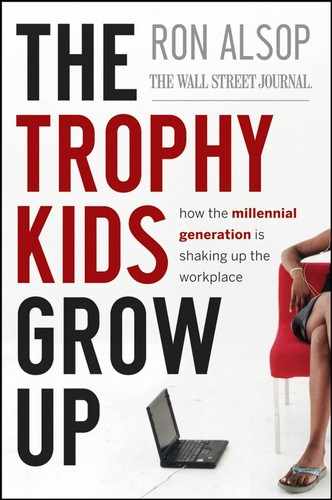5.1. SINGING THEIR PRAISES
How did millennials become so hungry for feedback and praise? It started the day they were born, when parents and other relatives began bragging about how special they were and celebrating every milestone of their lives. Taking their first steps and speaking their first words were major accomplishments, worthy of kudos and presents. Then there were the graduation ceremonies and gifts when the millennials moved from preschool to kindergarten. By the time they hit first grade, it's no wonder that they felt like the center of the universe.
Millennials heard the words "Good job" just for swinging a bat or finishing homework. In sports, everyone received trophies and medals, whether he sat out the season on the bench or hit home runs as the team's most valuable player. When their children didn't receive sports trophies, parents bought their own for their disappointed darlings, sometimes fibbing and claiming they were actually from the coach. One mother even told me that her daughter asked if she would receive a prize when she had her first menstrual period. Surprised but touched, her mother kindly told her, "No, but this does mean you have a new responsibility."
The craving for recognition in the workplace is also understandable, given the millennial generation's intense focus on school grades and test scores. As federal and state agencies required annual achievement tests from elementary school through high school, millennials became accustomed to receiving a regular assessment of how they stacked up against their fellow students and other students throughout the state.
Concerned about attaining a superlative grade-point average for college applications, many millennials—and their parents—have become particularly obsessed with grades in high school. Millennials want to track their progress weekly, even daily. A troubling development is the constant online access to grades in many school districts. For example, some Internet sites allow parents and their children 24/7 access to every grade in every class. When a teacher enters a grade in the system, the student's average for the quarter is automatically recalculated. Such a system surely feeds the obsession with grades.
Once they're in college, millennials continue to concentrate on making the grade. Professors note that students grow anxious if they don't receive grades regularly throughout their courses and seem much more concerned about the final grade than about what they have learned. "Our students focus so much on grades because it's so hard to get into a place like Dartmouth," says Faith Beasley, associate professor of French at Dartmouth College in Hanover, New Hampshire. "Once they get in, they'll even shy away from professors who are known as tough graders." Beasley knows that all too well. Despite her reputation as an outstanding teacher, her strict grading policy sometimes results in smaller enrollments. "When you get an A in my class, it's an A you can be really proud of," she tells students. But when reality hits, students are sometimes shell-shocked. One student told her that her father didn't pay Dartmouth's high tuition so she could receive a mere B in French.
"There are some students who want constructive criticism, but the vast majority think they know everything and really just want positive feedback," Beasley says. Once a student gave Beasley a stamp with a smiley face on it. "You don't say anything nice; you only critique us," the young woman told Beasley. "So use this stamp when you think something is good.
" The millennials' need for acclaim in the workplace has also been fueled by a number of cultural factors—from children's television programs like Mister Rogers' Neighborhood with their message that everybody's special to the self-esteem movement that blossomed in the 1980s. California officials even created a government task force to promote self-esteem. More recently in England, there was an unsuccessful push to ban the word "failure" from schools and replace it with the term "deferred success."
Some educators warn that too little criticism and too much unwarranted praise could actually encourage complacency and make millennials less willing to take the risks necessary to truly excel. Over time, too much praise for too many people could even make the adulation seem rather meaningless. There's a telling moment in the popular animated movie The Incredibles, when the superhero mother tells her son that "Everyone's special," and he replies, "Which is another way of saying no one is."
Some researchers believe that all the ego massaging has clearly made the millennial generation more narcissistic. "Young people born after 1982 are the most narcissistic generation in recent history," declares Jean Twenge, a psychology professor at San Diego State University, who along with other researchers analyzed the responses of college students to the Narcissistic Personality Inventory between 1982 and 2006. On the inventory, students respond to such statements as "If I ruled the world, it would be a better place" and "I think I am a special person." The professors found that 30% more students showed elevated levels of narcissism in 2006, compared to 1982.
"I think we have been creating a softer generation, not a greater generation," says Karen Boroff, dean of the Stillman School of Business at Seton Hall University. "The 2Rs that we haven't been teaching enough are resourcefulness and resilience. Young people have been told they're so great, but now they don't have the antibodies for dealing with criticism and failure."
